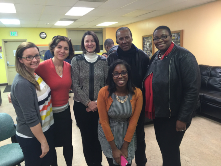Faculty: Jane Murphy and Lila Meadows

The UBalt School of Law’s clinical program’s Juvenile Justice Project (JJP) faculty and students met with with Walter Lomax who leads the Maryland Restorative Justice Initiative. The students attended a meeting of former inmates released under the Maryland Court of Appeals decision in State v. Unger. JJP student attorneys talked with former inmates, their families and social workers about the challenges they have faced in the transition from prison to the outside. These conversations will assist JJP student attorneys in arguing for release of their clients, who have been incarcerated since they were juveniles, before the courts and the Parole Commission.
In the photo from left Alexandra Rickart, 3L Day, Eve Hanan, JJP Clinical Teaching Fellow, Jane Murphy, JJP Clinic Director, Walter Lomax and Towanda Luckett, 4L Part Time. Pictured in front row, Raylynn Cummings, 2L Day
Recent Supreme Court case law has set limits on life prison sentences for children, opening the door to an array of options for reducing long sentences. Student attorneys, working under the supervision of faculty, will represent clients serving life sentences in their efforts to secure release.
Who We Serve:
Clinic clients are men and women who were convicted of homicide offenses before the age of 18 and sentenced to life or life without parole. Many of the clinic clients have served decades of their sentences, growing up behind bars. Their representation through the clinic may be their first meaningful opportunity to present a full and complete picture of who they are to a court or agency capable of permitting their return home.
Learn more about the clinic from this Baltimore Sun Article.
Profiles of children sentenced to life can be found in this episode of Frontline, “When Kids Get Life” and some of our clients are featured in "Still Blocking the Exit."
What We Do:
The Clinic represents clients preparing for parole hearings before the Parole Board, and in Motions to Correct Illegal Sentences before the Circuit Court. Student attorneys also represent clients in appeals from Circuit Court denials of Motions to Correct Illegal Sentences.
Students may also work on amicus briefs or legislative and policy efforts to improve sentencing practices for juveniles. https://ublawclinic.wordpress.com/2016/03/
JJP Student Attorneys, 3L Sheryl Redwood and 2L Karilyn Lee, recently participated in preparing an amicus brief filed in the Court of Appeals. https://ublawaccolades.wordpress.com/2018/02/02
JJP Student Attorney, 2L Karilyn Lee, recently testified in Annapolis in support of HB846. https://ublawaccolades.wordpress.com/2018/02/16/juvenile-justice-project-student-testifies-about-parole-reform/
In their role as the attorneys for incarcerated clients, student attorneys will:
- interview incarcerated clients;
- investigate clients’ backgrounds, including their
family life, school records, Department of
Corrections records, and trial transcripts;
- collect and assemble mitigating evidence;
- draft and assemble parole packets for the Parole Board;
- present the case for parole to parole commissioners;
- represent clients in the Circuit Court in motions to correct illegal sentences; and
- draft appellate briefs to address issues in juvenile sentencing in the Maryland courts of
appellate jurisdiction.
Policies and Procedures:
The Juvenile Justice Project is a 3-credit clinic. Students will meet once a week as a group with faculty supervisors and additionally as needed depending on case work. Students will spend approximately 10 hours on clinic work each week.
Prerequisite: First-year day courses
Pre- or co-requisites:Professional Responsibility
Recommended Courses: Juvenile Justice and Sentencing and Plea Bargaining Seminar
Policies and Procedures
The Juvenile Justice Project selects all of its students under the lottery system. Applications are due at specific dates the semester prior and follow set procedures.
Save
